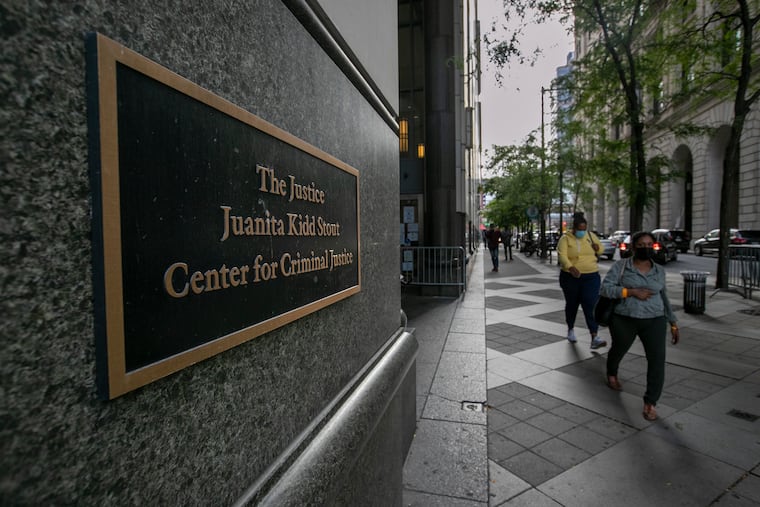As COVID-19 continues to impact Philly’s criminal courts, some lawyers say a lack of vaccines is ‘life-threatening’
“This is despicable," one lawyer said. "The mayor should be ashamed of himself. The health commissioner should be ashamed of himself.”

Concerns have escalated in recent days about the coronavirus’ impact on Philadelphia’s criminal courthouse, with two trials delayed due to possible COVID-19 exposures, and a defendant in a third trial saying in court that he had been exposed while in custody. He later tested positive, officials said, forcing lawyers in the case to self-quarantine.
Those developments late last week sparked a series of discussions between criminal justice stakeholders about how to manage proceedings in the Stout Center for Criminal Justice, the busiest criminal courthouse in Pennsylvania, where jury trials resumed March 1 after being suspended for months.
The turmoil also caused some attorneys to criticize the fact that most people who work in the courthouse, or who are otherwise required to appear there — prosecutors, defense lawyers, stenographers, court criers, clerks, and many defendants, especially those held in city jails — have generally not been eligible to receive a vaccine.
”The consequences are life-threatening,” said Chief Defender Keir Bradford-Grey, whose office employs hundreds of lawyers and staffers.
Michael Diamondstein, the defense attorney in one of the trials delayed last week, erupted in court after his case was put on hold, calling it “absolutely disgusting” that courthouse employees are continuing to work indoors, often in small or poorly ventilated courtrooms, without the ability to receive a shot.
”The fact that I’ve got to now worry about that I was exposed to the COVID virus for doing my constitutional duty, and [the judge], who is not a young man, was exposed, and the court staff and [the prosecutor] — this is outrageous,” Diamondstein said, according to a transcript. “This is despicable. The mayor should be ashamed of himself. The health commissioner should be ashamed of himself.”
James Garrow, a spokesperson for the city’s Public Health Department, said in a statement that although officials understood the legal community’s concerns, the city was working to address racial disparities in inoculations across the city, and veering from that path could have consequences.
“Every person moved up on the list moves another person down,” Garrow said.
The 17-story building at 13th and Filbert Streets has been the city’s primary criminal courthouse for a quarter-century. Known for its cramped and unreliable elevators and crowded hallways and staircases, it has traditionally hosted tens of thousands of cases per year, although activity has been significantly curtailed since the pandemic.
In some ways, the debate now playing out in that building reflects a broader societal anxiety over the country’s unequal vaccine distribution — and the challenges in seeking to rectify existing inequities. According to the city’s guidelines, legal workers in Philadelphia are generally not eligible to be vaccinated until after the city has given shots to other groups of people, including health-care workers, residents of long-term care facilities, essential workers, and those with other health concerns. The Health Department has not said when it might expand the eligibility criteria to include a larger population..
Garrow said the department had been discussing with court leadership the possibility of speeding up distribution “for those attorneys and staff most at risk.” He did not provide further details.
He also said that officials were “working with haste to vaccinate both employees and residents of our prison system” and that several hundred people in jail — where more than 4,600 people were being held — had been vaccinated as of last week.
And the city said that on Friday it began rapid-testing people in custody before bringing them to the courthouse, an effort first reported by WHYY.
The issues at the courthouse last week show why some within the justice system have grown frustrated.
In one case, a homicide trial, a jury had been selected and testimony was set to begin Wednesday morning. But the defendant, Tysheem Smith, was not brought from the jail because he had potentially been exposed to another person in custody with the coronavirus, according to his attorney, Josh Scarpello.
Common Pleas Court Judge Rose Marie DeFino-Nastasi sought to reschedule the case for this week, Scarpello said, but three jurors said they weren’t available.
The court system is already staring down a massive case backlog due to the pandemic. As a result, Smith’s case was rescheduled for the earliest possible date: January 2022.
“He missed his opportunity to go to trial [last] week, and it’s really unfortunate,” Scarpello said.
In another courtroom Wednesday morning, a defendant was brought in from custody for a verdict in an attempted-murder trial. He was found not guilty on all charges.
While in the room, however, he told people he had been exposed to COVID-19 in custody. And after the trial he tested positive, according to a spokesperson for the Defender Association.
The prosecutor and public defender on the case were each self-quarantining as a result. Bradford-Grey said it was “crazy” that events like that could imperil the health of people who have to work but are not yet eligible for a shot. “This is why [the city] needs to vaccinate,” she said.
The case Diamondstein was litigating, a homicide bench trial, was suspended Thursday after several days of testimony when his client was potentially exposed to an infected inmate.
Diamondstein said it was a “disgrace” and “abhorrent” to continue to deny courthouse workers vaccines.
“There are hundreds of men and women … who have been continually, since COVID started, putting their lives and the lives of their families on the line,” he said in an interview.
The trial for his client is scheduled to resume later this week. Diamondstein said he has not been told if his client ever tested positive for the virus.